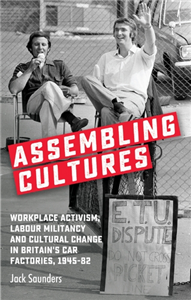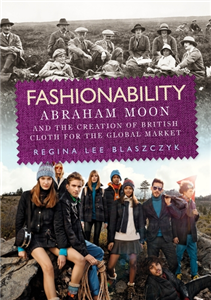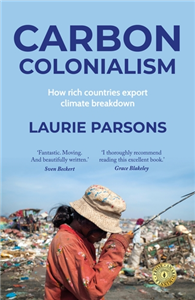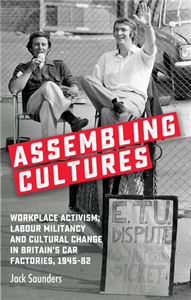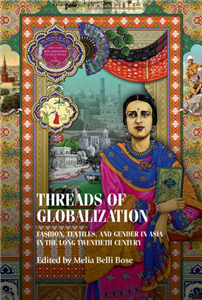Your Search Results
-
Promoted Content
-
Promoted ContentHumanities & Social SciencesMay 2019
Assembling cultures
Workplace activism, labour militancy and cultural change in Britain's car factories, 1945-82
by Jack Saunders
List of figures Acknowledgements List of abbreviations Introduction 1 Car workers, trade unions and public discourse 2 Organising the car factories, 1945-64 3 Decentralised direct democracy, 1964-68 4 Re-making workplace trade unionism, 1968-75 5 Towards "strike free", 1975-82 Conclusion Bibliography Index
-
 Trusted Partner
Humanities & Social SciencesMay 2019
Trusted Partner
Humanities & Social SciencesMay 2019Assembling cultures
Workplace activism, labour militancy and cultural change in Britain's car factories, 1945-82
by Jack Saunders
-
 Trusted Partner
Humanities & Social SciencesMay 2019
Trusted Partner
Humanities & Social SciencesMay 2019Assembling cultures
Workplace activism, labour militancy and cultural change in Britain's car factories, 1945-82
by Jack Saunders
Assembling cultures takes a fine-grained look at workplace activism in car manufacturing between 1945 and 1982, using it as a key case for unpicking narratives around affluence, declinism and class. It traces the development of the militant car worker stereotype, looking at the social relations which lay behind the industry's reputation for conflict. This book reveals a changing, complex world of social practices, cultural norms, shared values and expectations. From the 1950s, car workers developed shop-floor organisations of considerable authority, enabling some new demands of their working lives, but constraining other more radical political aims. This is a story of workers and their place in the power relations of post-war Britain. This book is invaluable to academics and students studying the history, sociology and politics of modern Britain, particularly those with an interest in power, rationality, class, labour, gender and race.
-
 Trusted Partner
Business, Economics & LawOctober 2017
Trusted Partner
Business, Economics & LawOctober 2017Fashionability
Abraham Moon and the creation of British cloth for the global market
by Regina Lee Blaszczyk
Fashion studies is a burgeoning field that often highlights the contributions of genius designers and high-profile brands with little reference to what goes on behind the scenes in the supply chain. This book pulls back the curtain on the global fashion system of the past 200 years to examine the relationship between the textile mills of Yorkshire - the firms that provided the entire Western world with warm wool fabrics - and their customers. It is a microhistory of a single firm, Abraham Moon and Sons Ltd, that sheds light on important macro questions about British industry, government policies on international trade, the role of multi-generational family firms and the place of design and innovation in business strategy. It is the first book to connect Yorkshire tweeds to the fashion system. Written in lively, accessible prose, this book will appeal to anyone who works in fashion or who wears fashion. There is nothing like it - and it will raise the bar for historical studies of global fashion. Here you'll find intriguing stories about a tweed theft from the Leeds Coloured Cloth Hall, debates on tariffs and global trade, the battle against synthetic fibres and the reinvention of British tweeds around heritage marketing. You won't be bored.
-
 Trusted Partner
Humanities & Social SciencesJanuary 2020
Trusted Partner
Humanities & Social SciencesJanuary 2020Assembling cultures
Workplace activism, labour militancy and cultural change in Britain's car factories, 1945-82
by Jack Saunders
Assembling cultures takes a fine-grained look at workplace activism in car manufacturing between 1945 and 1982, using it as a key case for unpicking narratives around affluence, declinism and class. It traces the development of the militant car worker stereotype, looking at the social relations which lay behind the industry's reputation for conflict. This book reveals a changing, complex world of social practices, cultural norms, shared values and expectations. From the 1950s, car workers developed shop-floor organisations of considerable authority, enabling some new demands of their working lives, but constraining other more radical political aims. This is a story of workers and their place in the power relations of post-war Britain. This book is invaluable to academics and students studying the history, sociology and politics of modern Britain, particularly those with an interest in power, rationality, class, labour, gender and race.
-
 Trusted Partner
Business, Economics & LawAugust 2020
Trusted Partner
Business, Economics & LawAugust 2020Fashionability
Abraham Moon and the creation of British cloth for the global market
by Regina Lee Blaszczyk
Fashion studies is a burgeoning field that often highlights the contributions of genius designers and high-profile brands with little reference to what goes on behind the scenes in the supply chain. This book pulls back the curtain on the global fashion system of the past 200 years to examine the relationship between the textile mills of Yorkshire - the firms that provided the entire Western world with warm wool fabrics - and their customers. It is a microhistory of a single firm, Abraham Moon and Sons Ltd, that sheds light on important macro questions about British industry, government policies on international trade, the role of multi-generational family firms and the place of design and innovation in business strategy. It is the first book to connect Yorkshire tweeds to the fashion system. Written in lively, accessible prose, this book will appeal to anyone who works in fashion or who wears fashion. There is nothing like it - and it will raise the bar for historical studies of global fashion. Here you'll find intriguing stories about a tweed theft from the Leeds Coloured Cloth Hall, debates on tariffs and global trade, the battle against synthetic fibres and the reinvention of British tweeds around heritage marketing. You won't be bored.
-
 Trusted Partner
Geography & the EnvironmentMay 2023
Trusted Partner
Geography & the EnvironmentMay 2023Carbon colonialism
How rich countries export climate breakdown
by Laurie Parsons
Around the world, leading economies are announcing significant progress on climate change. World leaders are queuing up to proclaim their commitment to tackling the climate crisis, pointing to data that shows the progress they have made. Yet the atmosphere is still warming at a record rate, with devastating effects on poverty and precarity in the world's most vulnerable communities. Are we being deceived? Climate change is devastating the planet, and globalisation is hiding it. This book opens our eyes. Carbon colonialism explores the murky practices of outsourcing a country's environmental impact, where emissions and waste are exported from rich countries to poorer ones; a world in which corporations and countries are allowed to maintain a clean, green image while landfills in the world's poorest countries continue to expand, and droughts and floods intensify under the auspices of globalisation, deregulation and economic growth. Taking a wide-ranging, culturally engaged approach to the topic, the book shows how this is not only a technical problem, but a problem of cultural and political systems and structures - from nationalism to economic logic - deeply embedded in our society.
-
 Trusted Partner
Geography & the EnvironmentMay 2023
Trusted Partner
Geography & the EnvironmentMay 2023Carbon colonialism
How rich countries export climate breakdown
by Laurie Parsons
Around the world, leading economies are announcing significant progress on climate change. World leaders are queuing up to proclaim their commitment to tackling the climate crisis, pointing to data that shows the progress they have made. Yet the atmosphere is still warming at a record rate, with devastating effects on poverty and precarity in the world's most vulnerable communities. Are we being deceived? Climate change is devastating the planet, and globalisation is hiding it. This book opens our eyes. Carbon colonialism explores the murky practices of outsourcing a country's environmental impact, where emissions and waste are exported from rich countries to poorer ones; a world in which corporations and countries are allowed to maintain a clean, green image while landfills in the world's poorest countries continue to expand, and droughts and floods intensify under the auspices of globalisation, deregulation and economic growth. Taking a wide-ranging, culturally engaged approach to the topic, the book shows how this is not only a technical problem, but a problem of cultural and political systems and structures - from nationalism to economic logic - deeply embedded in our society.
-
 Trusted Partner
Geography & the EnvironmentMay 2023
Trusted Partner
Geography & the EnvironmentMay 2023Carbon colonialism
How rich countries export climate breakdown
by Laurie Parsons
Around the world, leading economies are announcing significant progress on climate change. World leaders are queuing up to proclaim their commitment to tackling the climate crisis, pointing to data that shows the progress they have made. Yet the atmosphere is still warming at a record rate, with devastating effects on poverty and precarity in the world's most vulnerable communities. Are we being deceived? Climate change is devastating the planet, and globalisation is hiding it. This book opens our eyes. Carbon colonialism explores the murky practices of outsourcing a country's environmental impact, where emissions and waste are exported from rich countries to poorer ones; a world in which corporations and countries are allowed to maintain a clean, green image while landfills in the world's poorest countries continue to expand, and droughts and floods intensify under the auspices of globalisation, deregulation and economic growth. Taking a wide-ranging, culturally engaged approach to the topic, the book shows how this is not only a technical problem, but a problem of cultural and political systems and structures - from nationalism to economic logic - deeply embedded in our society.
-
 Trusted Partner
Humanities & Social SciencesJuly 2025
Trusted Partner
Humanities & Social SciencesJuly 2025Threads of labour
Tapestry of an ex-industrial community
by Lisa Taylor
Charting a collaborative art-based project using carpet-making skills and the industrial heritage of the region, the book investigates how a cleaved ex-industrial community used arts methodologies as a cohesion strategy. Drawing on images from the company's archives, the book mines the history of Firths Carpets Limited, a firm that carpeted interiors across the globe from the mid-1800s. Women's labour and tastes were business critical to the production and sale of Firths carpets. Drawing on the author's personal connection to the village, an ethnographic sensibility and novel research techniques, ex-worker responses to a village radically altered by ruination are explored. Ex-workers felt nostalgia for the dignity of work and a sense of homesickness in a village ghosted by industrial spectres of the past. Threads of Labour argues that left-behind deindustrialised places require acts of social re-making if their communities are to survive.
-
 Trusted Partner
Geography & the EnvironmentMay 2025
Trusted Partner
Geography & the EnvironmentMay 2025Carbon colonialism
How rich countries export climate breakdown
by Laurie Parsons
A hard-hitting exposé that reveals how rich countries outsource the climate crisis to poor ones. Around the world, leading economies are announcing significant success in the struggle against climate change. Heads of government proclaim their commitment to tackling the crisis, pointing to data that shows the progress they have made. Yet the atmosphere is still warming at a record rate. Are we being deceived? In Carbon colonialism, Laurie Parsons exposes how rich countries cook the books on climate change - by outsourcing it to the global South. Conducting first-hand research across Asia, he reveals how exporting emissions and waste allows states and corporations to maintain a clean, green image. Meanwhile, landfills expand and droughts and floods intensify, with devastating effects on the world's most vulnerable communities. Technical fixes and creative accounting are a mirage. The real obstacles to effective action are deeply embedded in the political systems and structures of our society. Parsons calls on readers to wake up from the fairy tales of greenwashing and ethical consumerism and end carbon colonialism now.
-
 Trusted Partner
The ArtsFebruary 2024
Trusted Partner
The ArtsFebruary 2024Threads of globalization
Fashion, textiles, and gender in Asia in the long twentieth century
by Melia Belli Bose
Threads of globalization is an interdisciplinary volume that brings fashion-specific garments, motifs, materials, and methods of production into dialogue with gender and identity in various cultures throughout Asia during the long twentieth century. It examines how the shift from artisanal production to 'fast fashion' over the past 150 years has devalued women's textile labour and how skilled textile/ garment makers and the organizations that support them are preserving and reviving heritage traditions. It also offers examples of how socially engaged artists in Asia and the diaspora use their work to criticize labour and environmental abuses in the global fashion industry.
-
 Trusted Partner
The ArtsFebruary 2024
Trusted Partner
The ArtsFebruary 2024Threads of globalization
Fashion, textiles, and gender in Asia in the long twentieth century
by Melia Belli Bose
Threads of globalization is an interdisciplinary volume that brings fashion-specific garments, motifs, materials, and methods of production into dialogue with gender and identity in various cultures throughout Asia during the long twentieth century. It examines how the shift from artisanal production to 'fast fashion' over the past 150 years has devalued women's textile labour and how skilled textile/ garment makers and the organizations that support them are preserving and reviving heritage traditions. It also offers examples of how socially engaged artists in Asia and the diaspora use their work to criticize labour and environmental abuses in the global fashion industry.
-
 Trusted Partner
The ArtsJanuary 2026
Trusted Partner
The ArtsJanuary 2026Threads of globalization
Fashion, textiles, and gender in Asia in the long twentieth century
by Melia Belli Bose
Threads of globalization is an interdisciplinary volume that brings fashion-specific garments, motifs, materials, and methods of production into dialogue with gender and identity in various cultures throughout Asia during the long twentieth century. It examines how the shift from artisanal production to 'fast fashion' over the past 150 years has devalued women's textile labour and how skilled textile/ garment makers and the organizations that support them are preserving and reviving heritage traditions. It also offers examples of how socially engaged artists in Asia and the diaspora use their work to criticize labour and environmental abuses in the global fashion industry.
-
 Trusted Partner
Humanities & Social SciencesMay 2021
Trusted Partner
Humanities & Social SciencesMay 2021Assembling cultures
Workplace activism, labour militancy and cultural change in Britain's car factories, 1945-82
by Jack Saunders
In British political discourse the idea that in the 1970s trade unions 'ran the country' has become a truism, a folk mythology invoked against the twin perils of socialism and strikes. But who exactly wielded power in Britain's workplaces and on what terms? Assembling cultures takes a fine-grained look at factory activism in the motor industry between 1945 and 1982, using car manufacturing as a key case for unpicking important narratives around affluence, declinism and class. It traces the development of the militant car worker stereotype and looks at the real social relations that lay behind car manufacturing's reputation for conflict. In doing so, this book reveals a changing, complex world of social practices, cultural norms and shared values and expectations. From relatively meagre interwar trade union traditions, during the post-war period car workers developed shop-floor organisations of considerable authority, enabling some to make new demands of their working lives, but constraining others in their more radical political aims. Assembling cultures documents in detail a historic process where, from the 1950s, groups and individuals set about creating and reproducing collective power and asks what that meant for their lives. This is a story of workers and their place in the power relations of post-war Britain. This book will be invaluable to lecturers and students studying the history, sociology and politics of post-war Britain, particularly those with an interest in power, rationality, class, labour, gender and race. The detailed analysis of just how solidarity, organisation and collective action were generated will also prove useful to trade union activists.
-
 Trusted Partner
The ArtsFebruary 2024
Trusted Partner
The ArtsFebruary 2024Threads of globalization
Fashion, textiles, and gender in Asia in the long twentieth century
by Melia Belli Bose
Threads of globalization is an interdisciplinary volume that brings fashion-specific garments, motifs, materials, and methods of production into dialogue with gender and identity in various cultures throughout Asia during the long twentieth century. It examines how the shift from artisanal production to 'fast fashion' over the past 150 years has devalued women's textile labour and how skilled textile/ garment makers and the organizations that support them are preserving and reviving heritage traditions. It also offers examples of how socially engaged artists in Asia and the diaspora use their work to criticize labour and environmental abuses in the global fashion industry.





